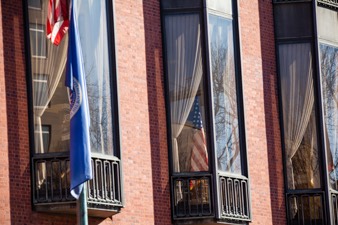 Eli Lilly and Company v. Teva Parenteral Medicines, No. 2015-2067, 2017 U.S. App. LEXIS 555 (Fed. Cir. Jan. 12, 2017) (Before Prost, C.J., Newman, and Dyk, J.) (Opinion for the court, Prost, C.J.) (Patent infringement is induced by a drug manufacturer when it unambiguously encourages performance of the infringing steps, as in its labeling for the drug.).
Eli Lilly and Company v. Teva Parenteral Medicines, No. 2015-2067, 2017 U.S. App. LEXIS 555 (Fed. Cir. Jan. 12, 2017) (Before Prost, C.J., Newman, and Dyk, J.) (Opinion for the court, Prost, C.J.) (Patent infringement is induced by a drug manufacturer when it unambiguously encourages performance of the infringing steps, as in its labeling for the drug.).
The Federal Circuit upheld a judgment by the district court that Teva’s proposed generic version of ALTIMA would infringe methods of treatment claimed by Eli Lilly in the ’209 patent-in-suit. The patent claims methods of administering the chemotherapy drug pemetrexed disodium (sold as ALIMTA) to treat certain types of lung cancer and mesothelioma. A physician pre-treats the patient with vitamin B12 and instructs the patient to self-administer folic acid before the physician administers the drug. The purpose of the dual-vitamin pretreatment is to reduce the toxicity of the drug.
The district court held the asserted claims of the ’209 patent valid and held Teva liable for induced infringement. Teva appealed.
The Federal Circuit found that there was direct infringement sufficient to support a finding of induced infringement, even though performance of the claimed steps required the actions of physicians and patients. The Court relied on its decision in Akamai V, where the Court found that performance of divided steps is attributable to a single entity when that entity (1) “conditions participation in an activity or receipt of a benefit” upon others’ performance of one or more claimed steps, and (2) “establishes the manner or timing of that performance.” Relying on the proposed product labeling for Teva’s drug and testimony from Eli Lilly’s expert, the Court found that physicians administering vitamin B12 “conditioned” a patient’s participation in pemetrexed treatment on their use of folic acid in the manner specified by the physician. Physicians established the manner and timing of the patient’s self-administration of folic acid. As a result, performance of all steps of the asserted claims could be attributed to a single entity — the physicians. In finding that Teva had the requisite intent for induced infringement, the Court noted that the product labeling Teva proposed unambiguously encouraged or recommended physicians to infringe the ’209 patent by prescribing a particular dose range and schedule to patients for self-administering folic acid.
The Court next found that the “vitamin B12” limitation recited in the ’209 patent was not indefinite under the test set forth in Nautilus, Inc. v. Biosig Instruments, Inc. Teva argued that the “vitamin B12” limitation was indefinite because vitamin B12 can be used in the art to refer either to cyanocobalamin specifically or to a class of compounds including cyanocobalamin more broadly. The Court found that a person of ordinary skill in the art, reading the ’209 patent in the context of medical supplements, would understand with reasonable certainty that the “vitamin B12” limitation referred to the supplementation form of vitamin B12, cyanocobalamin.
Next, the Court addressed Teva’s argument that the asserted claims were obvious over several references in the prior art. The district court found that a skilled artisan would not have been motivated to (1) use folic acid pretreatment with pemetrexed; (2) use vitamin B12 pretreatment with pemetrexed; or (3) use the claimed doses and schedules of folic acid and vitamin B12 pretreatment with pemetrexed. The Federal Circuit agreed with the district court on all fronts, finding that there was no evidence in the prior art of any relationship between vitamin B12, folic acid, and pemetrexed toxicity, let alone at the doses and schedules claimed by Eli Lilly.
Finally, the Court addressed Teva’s argument that the asserted claims were invalid for obviousness-type double patenting over the ’974 patent, also owned by Eli Lilly. Claims recited in a patent will be invalid based on obviousness-type double patenting if the claims are “not patentably distinct” from claims recited in an earlier-issued patent. The Court agreed with the district court that the asserted claims were not invalid because the claims of the ’974 patent “lack[] any recitation of vitamin B12 pretreatment, let alone dosage ranges or schedules of such pretreatment.” As a result, “the use of pemetrexed, use of vitamin B12, and doses and schedules of the asserted claims were patentably distinct from claim 20 of the ’974 patent.”
The Federal Circuit’s decision in Akamai V broadened the circumstances in which the actions of others may be attributed to a single actor to support liability for direct infringement. Here, a patent that claims a method of administering treatment can be directly infringed if a physician performs some of the claimed steps and the patient performs the other steps under the physician’s direction and control. The infringement is induced by the drug manufacturer when it unambiguously encourages the performance of the infringing steps, as in its labeling for the drug.
[Troutman-Ad]
[Troutman-About]

![[IPWatchdog Logo]](https://ipwatchdog.com/wp-content/themes/IPWatchdog%20-%202023/assets/images/temp/logo-small@2x.png)


![[Advertisement]](https://ipwatchdog.com/wp-content/uploads/2024/04/UnitedLex-May-2-2024-sidebar-700x500-1.jpg)
![[Advertisement]](https://ipwatchdog.com/wp-content/uploads/2024/04/Patent-Litigation-Masters-2024-sidebar-700x500-1.jpg)

![[Advertisement]](https://ipwatchdog.com/wp-content/uploads/2021/12/WEBINAR-336-x-280-px.png)
![[Advertisement]](https://ipwatchdog.com/wp-content/uploads/2021/12/2021-Patent-Practice-on-Demand-recorded-Feb-2021-336-x-280.jpg)
![[Advertisement]](https://ipwatchdog.com/wp-content/uploads/2021/12/Ad-4-The-Invent-Patent-System™.png)






Join the Discussion
2 comments so far.
You Know Who I Am
January 20, 2017 07:39 pmThis is a sound decision. No doctor would complete the treatment if the patient did not take the folic acid as directed, so the non-optional nature of the patient’s acts is a reasonable conclusion. This is a lot different than ordering something online or some other essentially volitional act.
Inventor
January 20, 2017 11:05 am….Of course Eli Lilly prevailed. They are undoubtedly a soft spoken (e.g. donator)Pence constituent.
(re: SCOTUS, Citizens United Decision, Corporations are People, my friend, bribes to a politician of your choice is the way corporations speak, freedom of speech you know).